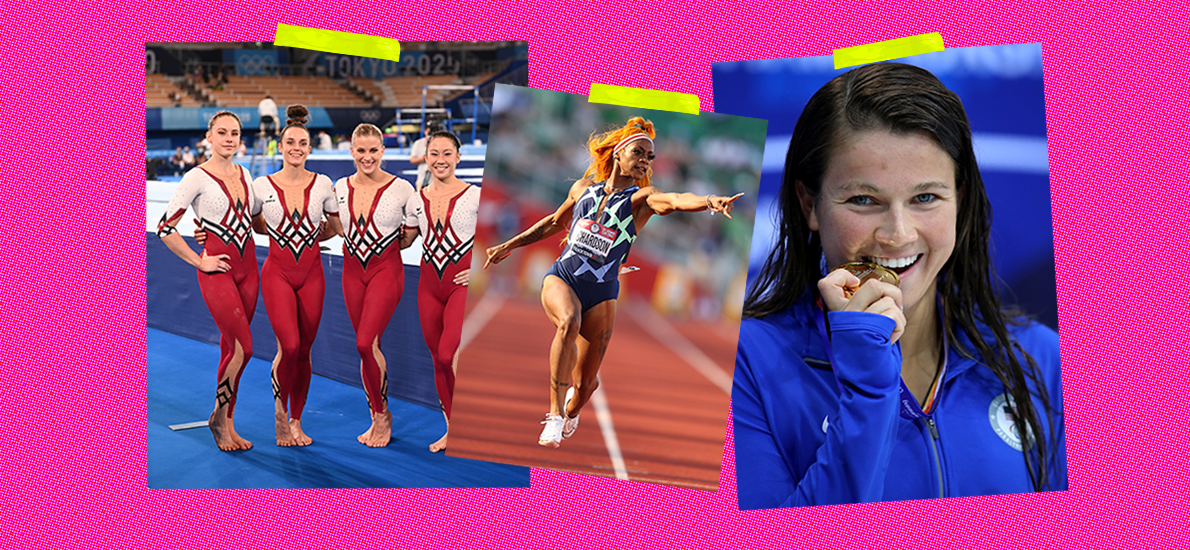In 2020, the Olympics dealt with every celebrity’s nightmare and every Republican politician’s favorite talking point: they were canceled, albeit literally. Athletes’ dreams were crushed, sponsors’ dollars gone. Thanks to modern medicine (and no thanks to your cousin who shares vaccine conspiracy theories on Facebook), plans were put in motion to resurrect the 2020 Olympics in 2021. But while much of the world spent the time off reckoning with how to address the systemic inequalities facing marginalized communities, it appears that sports leaders spent their year in lockdown figuring out how sexist, racist, and ableist they could possibly be. The Tokyo Olympics have finally arrived, and it feels like the governing bodies are going for gold in how many discriminatory practices they can employ at once.
In early July, news broke that the International Swimming Federation, known as FINA, refused to allow the Soul Cap, a swim cap designed for natural Black hair, at the Olympics. Their official statement claimed that the cap “does not follow the natural form of the head” and “could lead to an unfair advantage” despite being made of the same materials as the approved Speedo swimming caps. Scrutinizing what is and is not acceptable for Black hair has long been used as a tool to discriminate against and oppress Black people, especially Black women. While the initial impact of this decision affects Black Olympians, the overall implications can end up discouraging Black athletes and serving as a barrier for entry into competitive swimming.
Swimming is far from the only Olympic sport to discriminate against Black female athletes. From Sha’Carri Richardson being denied the ability to compete for legally smoking weed in Oregon while athletes such as Megan Rapinoe and others are praised for using CBD leading up to the Olympics, to judges undervaluing Simone Biles’ complicated (and dangerous) skills in order to level the playing field, racist double standards continue to make headlines.
The Olympics aren’t the only elite sporting group dropping the ball on creating equity and safe spaces for participants that aren’t white men. On July 20, the Norwegian women’s beach handball team was fined 1,500 Euros ($1,700 total) by the European Handball Association for wearing bike shorts instead of the required bikini bottoms during a championship match against Bulgaria—despite the fact that their men’s team wears the same. damn. thing. Even more disturbing, the bikini mandate comes from the International Handball Federation and dictates the bikini bottoms have “a close fit and cut on an upward angle toward the top of the leg,” while men can wear shorts as long as they’re “not too baggy”. (An IHF spokesperson told the New York Times, “We’re looking into it internally” and said that Norway was the only country that officially complained. The head of the Norwegian Handball Federation told the Times that Norway has protested the bikini bottom rule since 2006 and “nothing has happened”.) The oversexualization of female athletes via their uniforms is also a problem at the Olympics, by the way, where the German women’s gymnastics team decided to forego the traditional high-cut leotards in favor of full-body ones. It’s a move that the German Gymnastics Federation says is meant to push back against “sexualization in gymnastics,” and so that the athletes can “present themselves aesthetically—without feeling uncomfortable.”
International sporting organizations do not just have a problem with racism and sexism, though—ableism is another issue that is showing up, particularly in the Paralympics. As a disabled woman, I believe the denial of a personal care assistant for Becca Meyers last week is particularly egregious, because it isn’t just a form of discrimination, but of safety and human rights. The deaf blind swimmer and three-time gold medalist was forbidden from bringing her mother as her personal care assistant, despite it being allowed at international meets she’s competed in since 2017, because of rules for “non-essential” staff due to COVID-19 restrictions. The fact that Meyers was repeatedly told that her needs weren’t essential is ludicrous—PCAs aren’t friends or buddies people with disabilities bring around with them. They are their life source in a way—they help them meet their basic human needs when limitations from their disabilities arise. While the roles and responsibilities of PCAs vary depending on the needs of the disabled person, they are the only way that many disabled people feed, clothe, bathe, and use the bathroom.
Paralympic officials stated that there would be one “PCA” for 34 athletes when pushed on why reasonable accommodations weren’t being made, but PCAs are called Personal Care Assistants for a reason—they typically can only effectively support one disabled person’s needs at a time. The Paralympics are designed to be for people with disabilities, so why are there such ableist and discriminatory policies? While news outlets report that Meyers chose to drop out of the Paralympics because of this, the reality is that she didn’t choose to drop out—she was forced to. When you’re asked to “choose” between having your basic needs met or having the honor of representing your country in an elite competition you’ve trained your whole life for, there isn’t a choice you can make. You have to give up your dream because your basic human rights are not being accommodated for.
In a year when it seemed (key word: seemed) so many organizations made commitments to listening, learning, and bettering themselves, it’s especially disheartening to see multiple elite sporting organizations so profoundly drop the ball when it comes to supporting and protecting, their athletes and setting them up for success. As a woman with a disability, I have experienced firsthand what it’s like for people to make decisions on my behalf. When I looked at the executive board for the committees that were making these decisions, I noticed a trend that couldn’t be denied: the large majority of them were white, able-bodied, and male. So, it’s time for them to train for what is sure to feel like an Olympic Event for them: sit back and listen. Listen to the voices of Black people, especially Black women. Listen to the voices of women, who are tired of being sexualized. Listen to disabled people, especially when they tell you they need things to survive. These athletes train for years for the ability to represent their countries in these competitions and all they’re asking for is equity, safety, and respect. And they deserve it.
Images: Marijan Murat/picture alliance via Getty Images; Patrick Smith, Richard Heathcote / Getty Images




















































